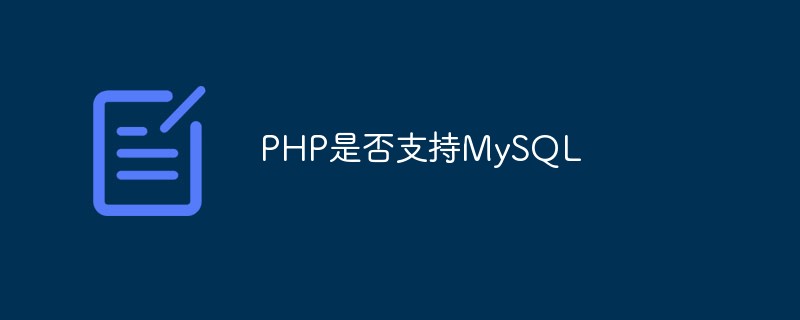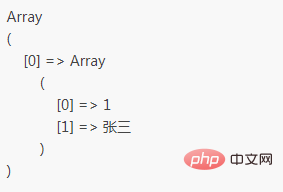Does PHP support MySQL?
PHP supports MySQL; MySQL is the database most commonly used with PHP, and they are often called the "golden combination". PHP provides complete functions for operating the MySQL database. These functions include everything from connecting to the database, executing SQL statements, processing data result sets, and closing the database. Through these functions, web development based on the MySQL database is made efficient and simple.

The operating environment of this tutorial: windows7 system, PHP8.1&&mysql8 version, Dell G3 computer.
The database can be said to be an indispensable part of a website. Nowadays, there are many kinds of databases in the database field. As a popular web page programming technology, the interaction between PHP and databases is inevitable.
PHP can operate a variety of databases, and MySQL is the most commonly used database with PHP. They are often called the "golden combination".
PHP provides complete functions for operating the MySQL database. These functions include everything from connecting to the database, executing SQL statements, processing data result sets to closing the database; through these functions, the Web based on the MySQL database Development is efficient and simple.
Usually the steps for PHP to access the MySQL database are as shown below:

Before this, we need to ensure that the mysqli extension in PHP is turned on. Taking the Windows system as an example, to enable the mysqli extension is to remove the comment extension=mysqli (php7) or extension=php_mysqli.dll (php5) in the php.ini configuration file. Can.
php connects to MySQL database
#When we successfully enable the mysqli extension in PHP, we can use the mysqli_connect() function in the extension. MySQL database connection, the function syntax format is as follows:
mysqli_connect(
[string $host = ini_get("mysqli.default_host")
[, string $username = ini_get("mysqli.default_user")
[, string $password = ini_get("mysqli.default_pw")
[, string $dbname = ""
[, int $port = ini_get("mysqli.default_port")
[, string $socket = ini_get("mysqli.default_socket")
]]]]]] )Parameter description is as follows:
$host: Optional parameter, the server to be connected. It can be a host name or an IP address;
$username: optional parameter, the MySQL user name used to log in;
$password : Optional parameter, the password used to log in;
$dbname: Optional parameter, the default database used when executing queries;
$ port: optional parameter, specifies the port number to connect to the MySQL server;
$socket: optional parameter, specifies the socket or named pipe to be used, this parameter is very important during development Use sparingly.
It should also be noted that the mysqli_connect() function is an alias of the mysqli::__construct() function, and all objects using mysqli() can also be used to connect to the database.
[Example] The following is a simple code to connect to the database.
1) Process-oriented writing method
<?php
$host = 'localhost';
$username = 'root';
$password = 'root';
$dbname = 'test';
$port = '3306';
$link = @mysqli_connect($host,$username,$password,$dbname,$port); // 连接到数据库
if($link){
mysqli_set_charset($link,'UTF-8'); // 设置数据库字符集
$sql = 'select * from user'; // SQL 语句
$result = mysqli_query($link, $sql); // 执行 SQL 语句,并返回结果
$data = mysqli_fetch_all($result); // 从结果集中获取所有数据
mysqli_close($link);
}else{
die('数据库连接失败!');
}
echo '<pre class="brush:php;toolbar:false">';
print_r($data);
?>2) Object-oriented writing method
<?php
$host = 'localhost';
$username = 'root';
$password = 'root';
$dbname = 'test';
$mysql = new Mysqli($host, $username, $password, $dbname);
if($mysql -> connect_errno){
die('数据库连接失败:'.$mysql->connect_errno);
}else{
$mysql -> set_charset('UTF-8'); // 设置数据库字符集
$sql = 'select * from user'; // SQL 语句
$result = $mysql -> query($sql);
$data = $result -> fetch_all();
$mysql -> close();
}
echo '<pre class="brush:php;toolbar:false">';
print_r($data);
?>The running results are as follows:

【Related recommendations: mysql video tutorial】
The above is the detailed content of Does PHP support MySQL?. For more information, please follow other related articles on the PHP Chinese website!

Hot AI Tools

Undresser.AI Undress
AI-powered app for creating realistic nude photos

AI Clothes Remover
Online AI tool for removing clothes from photos.

Undress AI Tool
Undress images for free

Clothoff.io
AI clothes remover

AI Hentai Generator
Generate AI Hentai for free.

Hot Article

Hot Tools

Notepad++7.3.1
Easy-to-use and free code editor

SublimeText3 Chinese version
Chinese version, very easy to use

Zend Studio 13.0.1
Powerful PHP integrated development environment

Dreamweaver CS6
Visual web development tools

SublimeText3 Mac version
God-level code editing software (SublimeText3)

Hot Topics
 PHP 8.4 Installation and Upgrade guide for Ubuntu and Debian
Dec 24, 2024 pm 04:42 PM
PHP 8.4 Installation and Upgrade guide for Ubuntu and Debian
Dec 24, 2024 pm 04:42 PM
PHP 8.4 brings several new features, security improvements, and performance improvements with healthy amounts of feature deprecations and removals. This guide explains how to install PHP 8.4 or upgrade to PHP 8.4 on Ubuntu, Debian, or their derivati
 How to fix mysql_native_password not loaded errors on MySQL 8.4
Dec 09, 2024 am 11:42 AM
How to fix mysql_native_password not loaded errors on MySQL 8.4
Dec 09, 2024 am 11:42 AM
One of the major changes introduced in MySQL 8.4 (the latest LTS release as of 2024) is that the "MySQL Native Password" plugin is no longer enabled by default. Further, MySQL 9.0 removes this plugin completely. This change affects PHP and other app
 How To Set Up Visual Studio Code (VS Code) for PHP Development
Dec 20, 2024 am 11:31 AM
How To Set Up Visual Studio Code (VS Code) for PHP Development
Dec 20, 2024 am 11:31 AM
Visual Studio Code, also known as VS Code, is a free source code editor — or integrated development environment (IDE) — available for all major operating systems. With a large collection of extensions for many programming languages, VS Code can be c
 How do you parse and process HTML/XML in PHP?
Feb 07, 2025 am 11:57 AM
How do you parse and process HTML/XML in PHP?
Feb 07, 2025 am 11:57 AM
This tutorial demonstrates how to efficiently process XML documents using PHP. XML (eXtensible Markup Language) is a versatile text-based markup language designed for both human readability and machine parsing. It's commonly used for data storage an
 PHP Program to Count Vowels in a String
Feb 07, 2025 pm 12:12 PM
PHP Program to Count Vowels in a String
Feb 07, 2025 pm 12:12 PM
A string is a sequence of characters, including letters, numbers, and symbols. This tutorial will learn how to calculate the number of vowels in a given string in PHP using different methods. The vowels in English are a, e, i, o, u, and they can be uppercase or lowercase. What is a vowel? Vowels are alphabetic characters that represent a specific pronunciation. There are five vowels in English, including uppercase and lowercase: a, e, i, o, u Example 1 Input: String = "Tutorialspoint" Output: 6 explain The vowels in the string "Tutorialspoint" are u, o, i, a, o, i. There are 6 yuan in total
 7 PHP Functions I Regret I Didn't Know Before
Nov 13, 2024 am 09:42 AM
7 PHP Functions I Regret I Didn't Know Before
Nov 13, 2024 am 09:42 AM
If you are an experienced PHP developer, you might have the feeling that you’ve been there and done that already.You have developed a significant number of applications, debugged millions of lines of code, and tweaked a bunch of scripts to achieve op
 Top 10 PHP CMS Platforms For Developers in 2024
Dec 05, 2024 am 10:29 AM
Top 10 PHP CMS Platforms For Developers in 2024
Dec 05, 2024 am 10:29 AM
CMS stands for Content Management System. It is a software application or platform that enables users to create, manage, and modify digital content without requiring advanced technical knowledge. CMS allows users to easily create and organize content
 How to Add Elements to the End of an Array in PHP
Feb 07, 2025 am 11:17 AM
How to Add Elements to the End of an Array in PHP
Feb 07, 2025 am 11:17 AM
Arrays are linear data structures used to process data in programming. Sometimes when we are processing arrays we need to add new elements to the existing array. In this article, we will discuss several ways to add elements to the end of an array in PHP, with code examples, output, and time and space complexity analysis for each method. Here are the different ways to add elements to an array: Use square brackets [] In PHP, the way to add elements to the end of an array is to use square brackets []. This syntax only works in cases where we want to add only a single element. The following is the syntax: $array[] = value; Example






